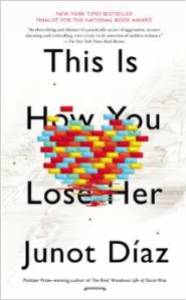“Neelima found a book that she thought I’d like,” said Srishti.
This is how you lose her is by Junot Diaz is the kind of book that Srishti would like as it doesn’t have pages and pages about the curtains. Plus Diaz makes his characters talk crass. ” Diaz’s characters have no filter and you cringe at the kind of slang he uses. For instance, the word nigger shows up repeatedly.”
The central theme is about a womanizer and relationships, in the context of Hispanic day to day struggles in the U.S. “It’s a bunch of short stories that are all connected in the end. “The first chapter was sappy. But then it got interesting. Junot Diaz talks about many social issues like women who always have to work harder and the idea of male privilege.”
I liked the way this story continued what Shyamala Rao talked about when she discussed her book Sonia Sotomayor: Supreme Court Justice by Carmen T. Bernier-Grand. In This is how you lose her , there are many sad immigrants’ tales in this book– the story of a useless teenager who doesn’t help his mom in any way, the story of a guy who leaves his family behind, and the awful living conditions of women in who live in small spaces, cramped together, saving for a better future.” This story is very different from the kind of immigrants Jhumpa Lahiri talks about. They are a more privileged class and they don’t face the kind of problems that Diaz talks about. Junot Diaz uses crass language to reflect the reality of the world inhabited by his characters,” Shyamala said.

“If you want crass writing from India, I suggest you read Upamanyu Chatterjee’s English August,” Arun said. “It’s the story of an IAS officer in a small town, whose life is a series of very ‘colorful’ vocabulary, if you get my point.”
Vaishali agreed, “It was impossible to enjoy the book the first time round, but I enjoyed reading it much later.”
 The story of crass vocabulary reflecting dire circumstances relates to the theme of the book party we had in September. Some people like Sonya Sotomayor rise above their circumstances, some people never get out of the rut as in Junot Diaz’s book, some have no hope as we saw in the bleak book White Tiger, and some no longer understand what their parents and grandparents fought for. One such book was Pema and the Yak by Siofran O’ Donovan; the story of the displaced community is one filled with grief, hope and a kind of futility.
The story of crass vocabulary reflecting dire circumstances relates to the theme of the book party we had in September. Some people like Sonya Sotomayor rise above their circumstances, some people never get out of the rut as in Junot Diaz’s book, some have no hope as we saw in the bleak book White Tiger, and some no longer understand what their parents and grandparents fought for. One such book was Pema and the Yak by Siofran O’ Donovan; the story of the displaced community is one filled with grief, hope and a kind of futility.
“What matters most is home, ” said Baara Al Mansour, the Syrian writer.
On that note, we wound up a long party (Read Parts 1, 2, 3, and 4 if you haven’t already) one of the best yet. The next time you read a book, why not discuss it
with a friend? You never know where books will lead you.













 In one of the books I had got to the party How to Read a Book (by Mortimer J. Adler and Charles Van Doren), there was a section about how to read poetry. I’ve
In one of the books I had got to the party How to Read a Book (by Mortimer J. Adler and Charles Van Doren), there was a section about how to read poetry. I’ve